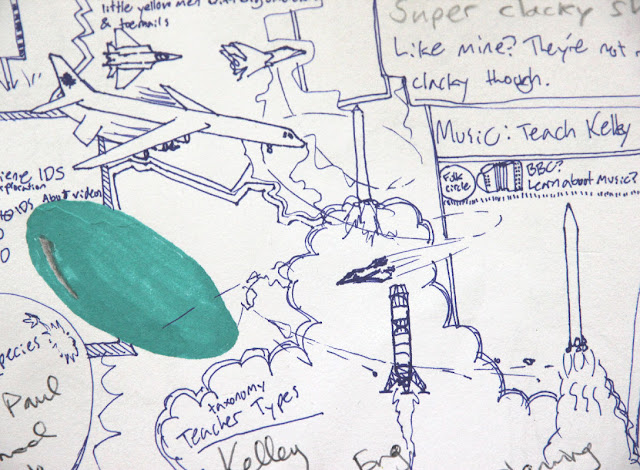 When I was in my early twenties, my partner and I understood that climate change was happening much faster than we'd previously understood, and that our future children would most definitely be impacted by it. We expected to feel the effects of our over-consumption by about 2050, when we'd be settling into retirement, and hopefully better prepared for whatever wars, famine, climate change or societal collapse might happen. And we had kids anyway, and we bought them lots of stuff, but I tried to limit my purchases to things that were educational or at least natural and beautiful and not made in countries that underpaid their workers or polluted with their factories. We only bought junky toys sometimes. And miraculously, my partner and I raised two kids who were happy to be given "experiences" or "wishes" as gifts from us and their friends... and they were still inundated with toys, clothing, books and other things, because frankly it's hard to walk down the street without returning home with something, whether it's brand new, from the thrift shop, from the free bin at school, or just found on the sidewalk. Stuff is everywhere, so it was hardly our fault.
When I was in my early twenties, my partner and I understood that climate change was happening much faster than we'd previously understood, and that our future children would most definitely be impacted by it. We expected to feel the effects of our over-consumption by about 2050, when we'd be settling into retirement, and hopefully better prepared for whatever wars, famine, climate change or societal collapse might happen. And we had kids anyway, and we bought them lots of stuff, but I tried to limit my purchases to things that were educational or at least natural and beautiful and not made in countries that underpaid their workers or polluted with their factories. We only bought junky toys sometimes. And miraculously, my partner and I raised two kids who were happy to be given "experiences" or "wishes" as gifts from us and their friends... and they were still inundated with toys, clothing, books and other things, because frankly it's hard to walk down the street without returning home with something, whether it's brand new, from the thrift shop, from the free bin at school, or just found on the sidewalk. Stuff is everywhere, so it was hardly our fault.In my thirties it became apparent that climate change was happening now, and that any associated plagues, wars, and apocalypse would destroy whatever parts of the world they might by the time our children were adults. And we knew that our own greed and consumption was complicit in this, so we challenged our family to stop giving gifts. We got some hearty approval, some reluctant cooperation, some quiet and not-so-quiet gift-giving-anyway, and some outrightly offended very dear friends and family, who justifiably said that our decision to opt out of consumerist holidays (while maintaining the treasured family gathering traditions we love) was selfish and arrogant, and a slap in the face to people who just wanted to give us gifts because they love us. Thank goodness we're still close to most of these people. If you're reading this, we hope you forgive us. We know the mistake was ours.
We failed. We are now in our forties, and the stirrings of war and societal collapse have been pulling at the hairs on our backs for a few years already. We managed to turn a few people away from gift-giving, got politically involved in efforts to stop consumerism, gave and received a few feel-good 'sponsorship' gifts, and tried very very hard to save the world, while still managing to fill our home with stuff. We also built more storage.
The problem is not gifting. The problem is wanting. This week I was out walking in the crisp autumn air with my friend, shuffling intentionally through the fluffy leaves, and trying to come to terms with the fact that I can't afford a new camera body for my current art project. My friend mentioned a psychological experiment she knows about, where in one asks oneself "what do I truly need?"... and of course ... I already have everything I truly need. I have a home to live in, as much food as my family can possibly eat, clean water, happy healthy children, and good friends with whom to enjoy the gorgeous piece of earth we live upon. Do I need a camera body for this project? No. I knew that already. I just wanted one, and used logic to convince myself I needed one. I also model that unfortunate skill to my children, all the time.
Yup. I'm still consuming, and the fault is mine.
Back to gifts. At dinner today I asked my kids what non-consumerist gifts would make them happy. They said they'd like to do things with us. Dedicated parent-kid time. They'd like to go hiking. They both thought that yesterday's hot chocolate picnic was an awesome gift. "But it wasn't a gift." We said. "Well, you know..." my son ventured. And my daughter explained that a gift has to be something unusual. For example reading a book together isn't much of a gift for a family that does it every night. But for our two teens who have been neglected in this way in recent years, it's a special thing right now. Dessert can be a gift if you don't do it often.
So, following this logic, which seems incredibly solid to me, it seems that gifts are gifts because we rarely do them. Holiday gift-giving has to be ever more extravagant because we buy so much during the year. If we want to survive, we have to stop buying stuff all the time. Then it would still be wonderful to give each other a hike or a good pair of mittens or a cup of hot chocolate for Christmas.

























